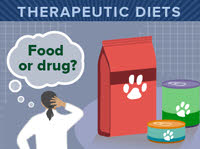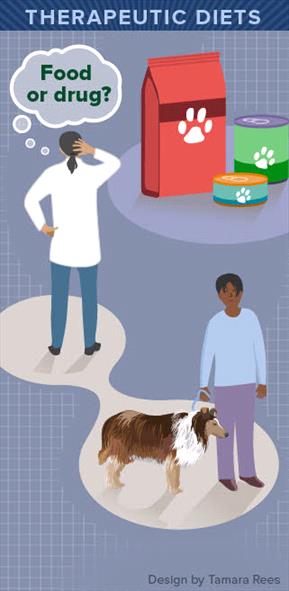

Three years after the U.S. Food and Drug Administration issued policy guidelines for pet diets that claim to allay or treat disease, veterinarians continue to have questions about these products and their responsibilities when recommending them.
In its April 2016 compliance policy guide on "Labeling and Marketing of Dog and Cat Food Diets Intended to Diagnose, Cure, Mitigate, Treat, or Prevent Diseases," the FDA instructed staff and industry to use "enforcement discretion" when regulating such diets. The guidance allows such diets to be regulated as food instead of drugs, even though the FDA states in the CPG that these diets meet the statutory definition of a drug "[b]y virtue of their intended use to treat or prevent disease."
Confusing the issue further is the fact that therapeutic diets are often informally called "prescription" diets. In fact, Hill's, a leading player in the therapeutic-pet-diet market, has trademarked the term "Prescription Diet."
The FDA's "enforcement discretion" comes with caveats, including that the diets be sold only under the direction of veterinarians. Exactly what that entails remains unclear to some practitioners.
On a message board of the Veterinary Information Network, an online community for the profession, some veterinarians recently said they're uncertain whether prescriptions are actually required for these diets; others aren't sure what the FDA expects of them before they make a diet recommendation. Veterinarians also are flummoxed by therapeutic diets sold on sites such as Amazon with no veterinarians involved in any way.
Diets that claim to address health conditions in pets, such as digestive disorders and obesity, have been around for more than 50 years. The FDA began developing guidelines after observing an increase in the number of cat and dog food products marketed for use in treating or preventing disease and an increase in the number of these products being sold directly to consumers, according to the CPG.
"When these products are marketed directly to pet owners, there is a greater potential for product misuse and/or misunderstanding of the role of the product in the disease treatment," the guidelines say.
The agency cites the example of diets for diabetic dogs and cats that claim to "control blood glucose," suggesting that owners might mistakenly believe that the diet can serve as the sole treatment, whereas the animals may require insulin therapy or another treatment.
According to the guidelines, the FDA is "less likely to initiate enforcement action" against pet food manufacturers (i.e., to regulate the diets as drugs) if they follow 11 recommendations relating to labeling, ingredients and manufacturing standards. The recommendations also include that the diets be made available to the public only through licensed veterinarians or by retail outlets selling under the direction of a veterinarian.
Dr. Andy Anderson had a question about that. The New Jersey-based veterinarian recently discovered that a client had been buying Hill's Prescription Diet z/d for food and skin sensitivities on their own from Amazon. "I reached out to Hill's and asked if they were aware this was happening and was told that they had no idea and that these diets do require scripts," Anderson wrote on a message board.
Anderson said he received a follow-up email from Hill's explaining that the company is working to solve the problem of unauthorized online sales of therapeutic food on Amazon. Although its trademarked brand name is Prescription Diet, Dr. Rosalie Behnke of Hill's Veterinary Consultation Service also told Anderson there is no legal requirement for a prescription. Hill's therapeutic diet line includes nutritional management for cats and dogs in various stages of health across a broad range of conditions such as bladder health, obesity, skin and food allergies, and accident recovery.
In a statement to the VIN News Service, Dr. Jolle Kirpensteijn, chief veterinary officer Hill's US, reaffirmed that the company is working to stop unauthorized sales of Prescription Diets via e-retailers. He also added that veterinarians' "oversight/direction can be provided in the form of a written authorization often referred to as a prescription."
The Pet Food Institute (PFI), an organization that advocates for pet food manufacturers in the U.S., maintains that therapeutic diets are not drugs and should not be treated as such. "Instead they are foods intended to assist in the nutritional management of pets with certain health conditions," wrote Duane Ekedahl, then PFI president in a letter submitted to the FDA during the CPG comment period in 2012. However, the PFI did concur with the FDA that these diets should be purchased only at the direction of a veterinarian.
Veterinarians' responsibilities
For veterinarians, the devil is in the details. When asked to clarify veterinarians' responsibilities in dispensing these diets, FDA spokesperson Anne Norris said the agency's rules are intended for regulators and industry, not as parameters for veterinarians.
This leaves veterinarians wondering if they need a veterinarian-client-patient relationship (VCPR) with a client to recommend a therapeutic diet; whether an annual exam is absolutely required; and whether there are restrictions on where this food is stored at the clinic, as is the case with prescription drugs. It also leads veterinarians to have to parse the difference between "prescription" and "authorization."
Raphael Moore, general counsel for VIN, recommends that veterinarians review their state's practice act, specifically how it defines the VCPR, for guidance on these sorts of questions. As an example, Moore pointed to California regulations, which call for a VCPR to "administer, prescribe, dispense or furnish a drug, medicine, appliance, or treatment of whatever nature for the prevention, cure, or relief of a wound, fracture or bodily injury or disease of an animal." He explained, "[W]hether or not the feed is a prescription is irrelevant — to the extent you are ‘dispensing' it for any of the stated purposes, you would need a valid VCPR."
But not all state practice acts are clear about this point, Moore said.
Kirpensteijn outlined by email some elements of Hill's distribution policy, as follows:
- All sales of Hill's Prescription Diet must be made with a nutritional recommendation or authorization of a licensed veterinarian who has a veterinarian-client-patient relationship with the pet parent and pet as defined by the AVMA. The treating veterinarian must provide active supervision of all indicated nutritional regimens as part of the VCPR.
- If the treating veterinarian is not on site at the veterinarian's clinic, an on-site member of the veterinary health care team must verify the treating veterinarian's nutritional recommendation or authorization by confirming directly information regarding the pet's condition and prescription recommendation, date of authorization and refills permitted, as well as contact information for the treating veterinarian and practice.
- The product can be sold by front desk staff if the pet parent has the appropriate nutritional recommendation/authorization requirements from an on-site veterinarian or a veterinary health care team member has verified the nutritional recommendation/authorization requirements from a treating veterinarian at an alternate location.
Kirpensteijn said that Hill's position is aligned with the CPG. "We support the FDA's position that these therapeutic pet foods should be treated as foods recommended by the veterinarian involved in the ongoing care of the pet," he said.
Likewise, Dr. Jason Gagne, director of Veterinary Technical Communications for Nestlé Purina, maker of a therapeutic line of cat and dog foods called ProPlan Veterinary Diets, said, "Verification that the diet is being used under a veterinarian's direction is required."
Responding to questions by email, Gagne said, "A VCPR is necessary for a veterinarian to recommend a therapeutic diet as part of a treatment plan. Veterinarians do this through a physical exam, and any other diagnostics that they deem appropriate."
Asked whether Purina has a position on whether these diets should be treated as food or drugs, Gagne said, "Purina is committed to complying with the FDA's CPG."
VIN co-founder and president Dr. Paul Pion has seen the confusion around this topic among members for years. He told VIN News, "Seems like the FDA and pet food companies, even when asked directly, are leaving this to the veterinarian, AVMA and state board to decipher through a looking glass that is as clear as mud."
Veterinarians on VIN message boards have complained about the FDA's half-in, half-out approach since the draft went out for public review in 2012. The final guidelines were not significantly revised.
"If FDA wants them treated like drugs, they should require approval and a prescription legend on their labels if the label cannot be written so that a client can safely and effectively use the drug," retired veterinary pharmacist Douglas Kemp wrote on VIN at the time. "That hasn't happened yet."
When asked why the FDA elected to exercise enforcement discretion and not treat the diets as drugs, FDA spokesperson Norris pointed back to the CPG and the FDA's long-standing practice of taking this approach.
She added, "These products may provide veterinarians with more tools to use in managing the health and needs of their patients with diseases, such as diabetes or kidney disease, and veterinarians typically periodically assess the need for and an animal's response to a product."